China issues white paper on Xinjiang Production and Construction Corps
Updated: 2014-10-05 11:17
(Xinhua)
|
||||||||
BEIJING - The Chinese government released a white paper Sunday detailing history and achievements made by the Xinjiang Production and Construction Corps (XPCC) to mark its 60th founding anniversary, highlighting its role in maintaining social stability and enhancing border defense.
"It has been a consistent policy of the central government to support the growth of the XPCC," said the white paper, published by the State Council Information Office under the title "History and Development of the Xinjiang Production and Construction Corps."
At present, Xinjiang is at a critical stage of achieving lasting social and political stability, the white paper said.
"It has been China's long-term strategy to give better play to the unique role of the XPCC in maintaining stability and safeguarding the border," it said.
"Under new conditions, the XPCC should never be allowed to weaken, but rather be strengthened."
The white paper elaborated on the founding, development, responsibilities, structure of the XPCC and its roles in promoting economic development, safeguarding the border areas, maintaining stability, and promoting ethnic unity in the western region.
Combining the functions of production, administration and defense, the XPCC has made "indelible contributions" to the development of Xinjiang by promoting unity among ethnic groups, maintaining social stability, and strengthening national border defense, it said.
As an important part of the Xinjiang Uygur Autonomous Region, the XPCC assumes the responsibilities entrusted to it by the state of cultivating and guarding the border areas, and operates an administrative system with unified Party, government, military and enterprise roles.
It is a special social organization that handles its own administrative and judicial affairs within the reclamation areas under its administration, in accordance with the laws and regulations of the state and Xinjiang Uygur Autonomous Region, with economic planning directly supervised by the state.
It is subordinated to the dual leadership of the central government and Xinjiang Uygur Autonomous Region, according to the white paper.
Starting from scratch 60 years ago, the XPCC workers have reclaimed ecological oases from the desolate Gobi desert, initiated Xinjiang's modernization, built large-scale agriculture and industrial and mining enterprises, and established new cities and towns through joining hands with local people of all ethnic groups.
By the end of 2013, the XPCC had 176 regiments, 14 divisions, an area of 70,600 square kilometers under its administration, including 1,244,770 hectares of farmland, and a population of 2,701,400, accounting for 11.9 percent of Xinjiang's total population, figures from the white paper show.
The total output value of the XPCC in 2013 was 149.987 billion yuan (24.2 billion U.S. dollars), 220 times that in 1954 when it was established, with an annual growth of 9.6 percent; and 22.9 times that in 1981 when the XPCC was reinstated, with an annual growth of 10.4 percent.
"Xinjiang has a long border, and safeguarding it is the responsibility the state has entrusted to the XPCC," the white paper said.
The XPCC, a highly organized paramilitary force, has played a special role in safeguarding Xinjiang's social stability and in cracking down on violent terrorist crimes, according to the white paper.
Since the 1980s the threat of the "three forces" -- separatists, religious extremists and terrorists -- to Xinjiang's social stability has grown, it said.
In rapid response to the July 5 Urumqi riot of 2009, the XPCC sent militias to patrol the city and guard key districts from possible attacks.
"At present, the XPCC is focusing its efforts on forging a top militia force in China, and building a system of regular rotation training and standby duty, which combines production, training, duty performance, and emergency response," it said.
"In the new historical period, the XPCC must play its part as a stabilizer of frontier security and stability, a melting pot of all ethnic groups, and a demonstration zone for advanced productive forces and culture," it said.
"It must reinforce itself, further its integration with the local society, be devoted to social stability and lasting peace in Xinjiang, and perform all its functions as entrusted by the central government."
 |
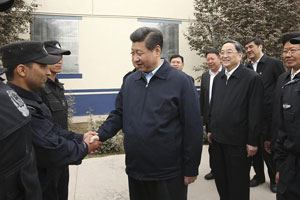 |
| Exhibition marks Xinjiang corps' beginnings | Xi promotes stability and ethnic harmony in Xinjiang |
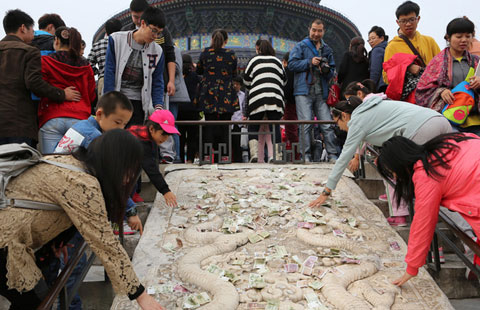
 Visitors trade cash for luck at World Heritage site
Visitors trade cash for luck at World Heritage site Sharapova beats Kvitova to win China Open
Sharapova beats Kvitova to win China Open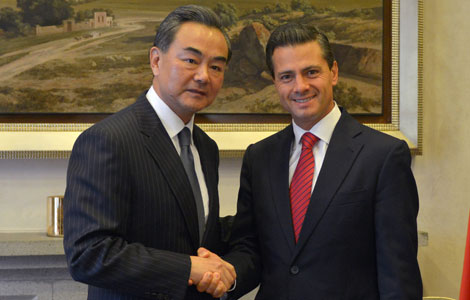
 China-Mexico ties deepen
China-Mexico ties deepen
 58 couples say 'I do' among the clouds
58 couples say 'I do' among the clouds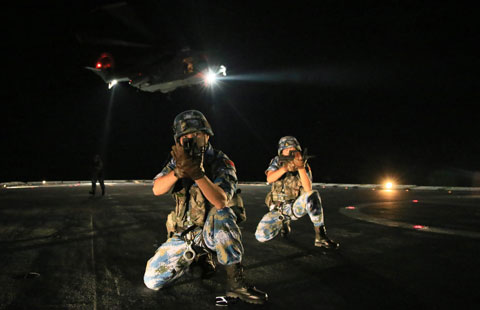
 Chinese convoy fleet executes escort missions in Gulf of Aden
Chinese convoy fleet executes escort missions in Gulf of Aden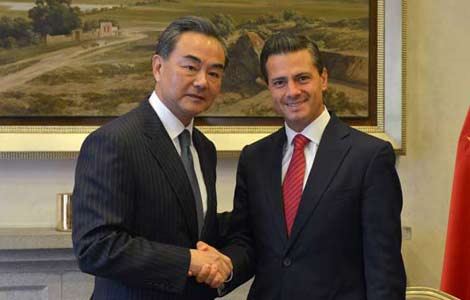
 Chinese FM Wang Yi meets with Mexican president
Chinese FM Wang Yi meets with Mexican president
 China leads medal table as Asian Games close
China leads medal table as Asian Games close
 Highlights at Paris auto show
Highlights at Paris auto show
Most Viewed
Editor's Picks

|

|

|

|

|

|
Today's Top News
Some protesters in HK decide to withdraw
China startups 'get smart' about healthcare devices
US, India stir S. China Sea debate
Brazilians more aware of breast cancer symptoms, survey finds
Ebola patient in Dallas struggling to survive, says CDC head
Ebola could reach France and UK
China's Xinjiang Corp marks 60th anniversary
19 arrested over clash in Hong Kong
US Weekly

|

|







